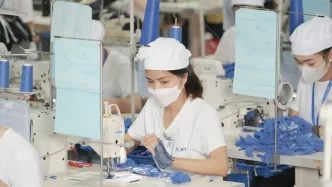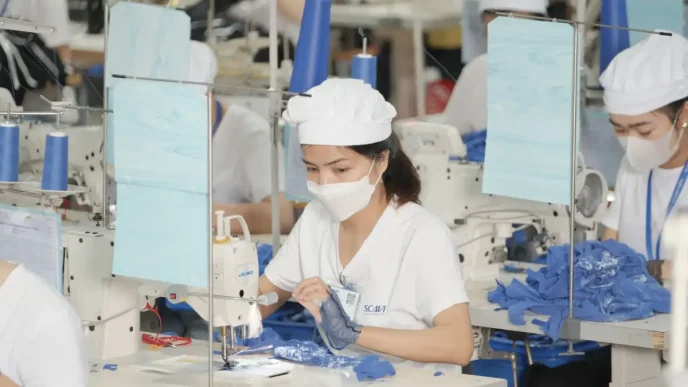In a significant display of regional diplomacy, Vietnam’s Party General Secretary Tô Lâm welcomed Timor-Leste’s President José Ramos-Horta to Hanoi on Tuesday, as the latter arrived to attend the second ASEAN Future Forum. The meeting, held amidst Vietnam’s preparations for its 14th National Party Congress, underscored a deepening partnership between the two nations, with both leaders expressing optimism about future collaboration across economic, cultural, and political spheres.
The ASEAN Future Forum, running from Tuesday to Wednesday, provided the backdrop for this high-level encounter, which builds on President Ramos-Horta’s state visit to Vietnam in August last year. The two leaders reviewed the progress in bilateral relations since that visit, noting a remarkable 21.4% increase in trade turnover in 2024 compared to the previous year. They also highlighted the positive impact of initiatives such as the visa exemption agreements for diplomatic and official passport holders and the contributions of Vietnam’s Viettel Military Industry – Telecommunications Group (operating as Telemor) to Timor-Leste’s socio-economic development.
A Shared Vision for Development
Party General Secretary Tô Lâm congratulated Timor-Leste on its socio-economic achievements and expressed confidence in the country’s ability to implement its ‘Strategic Development Plan for 2011-2030’. He emphasised Vietnam’s belief in Timor-Leste’s potential to build a democratic state while actively integrating into regional and global frameworks. In response, President Ramos-Horta praised Vietnam as a model of national development, expressing admiration for the leadership and resilience of the Vietnamese people in their journey towards becoming a developed, high-income nation by 2045.
The mutual respect was palpable as both leaders outlined ambitious plans to enhance cooperation. They agreed to increase high-level exchanges and establish new bilateral mechanisms tailored to their evolving needs. Key sectors identified for collaboration included agriculture, fisheries, food processing, telecommunications, education, oil and gas, infrastructure, aviation, energy, culture, tourism, and people-to-people exchanges. President Ramos-Horta also thanked Vietnam for sharing its development experiences, particularly in areas such as workforce training, food security, and poverty reduction.
Economic Cooperation: Untapped Potential
A significant portion of the discussions focused on economic ties, with both sides keen to explore untapped potential. The leaders committed to expanding joint initiatives in investment, finance, agriculture, and infrastructure projects, including industrial parks, airports, and seaports. Tourism and information technology were also highlighted as promising areas for collaboration. Vietnam’s expertise in these fields could play a pivotal role in supporting Timor-Leste’s development goals, particularly as the latter seeks to diversify its economy beyond oil and gas.
The involvement of Viettel’s Telemor in Timor-Leste was cited as a success story, contributing not only to economic growth but also to social development through improved telecommunications infrastructure. Such partnerships, both leaders agreed, could serve as a blueprint for future collaborations. If sustained, these efforts may position Vietnam as a key partner in Timor-Leste’s journey towards economic stability, though the scale of impact remains to be fully assessed.
Regional and Global Aspirations
Beyond bilateral ties, the meeting reflected a shared commitment to regional and international cooperation. Party General Secretary Tô Lâm reiterated Vietnam’s support for Timor-Leste’s roadmap to full ASEAN membership, commending the country’s determination to align with the bloc’s standards. Vietnam, as an established ASEAN member, has played a mentoring role for Timor-Leste, which became an observer state in 2011 and is working towards full integration.
President Ramos-Horta, in turn, endorsed Vietnam’s candidacy in multilateral mechanisms, including United Nations agencies, signaling Timor-Leste’s alignment with Vietnam’s growing global influence. Both leaders pledged to strengthen collaboration at international and regional forums, ensuring mutual support on issues of common interest. This alignment could enhance their collective voice within ASEAN, particularly on matters of regional stability and economic integration.
Vietnam’s Role as a Regional Leader
The timing of this meeting is noteworthy, as Vietnam is at a critical juncture in its own development trajectory. Having achieved many of the goals set out in the 13th National Party Congress, the country is now gearing up for the 14th Congress, which will chart its path towards becoming a high-income nation by 2045. Vietnam’s leadership views partnerships with countries like Timor-Leste as integral to its broader strategy of fostering regional solidarity while advancing its own economic and diplomatic objectives.
For Timor-Leste, Vietnam offers a blueprint for balancing rapid development with cultural preservation and political stability. President Ramos-Horta’s admiration for Vietnam’s progress suggests a desire to emulate aspects of its model, particularly in areas such as agricultural innovation and poverty alleviation. If Vietnam continues to share its expertise, as requested during the talks, it could cement its position as a mentor for smaller ASEAN nations, though the effectiveness of such knowledge transfer will depend on tailored implementation.
Challenges and Opportunities Ahead
While the discussions were overwhelmingly positive, both nations face challenges in translating their aspirations into tangible outcomes. For Vietnam, sustaining economic growth while supporting regional partners requires careful resource allocation and policy coordination. For Timor-Leste, overcoming structural barriers such as limited infrastructure and workforce capacity remains a priority. Collaborative projects in education and training, as proposed, could address some of these gaps, but their success hinges on consistent funding and political will.
Moreover, the geopolitical landscape of Southeast Asia adds complexity to their partnership. As ASEAN navigates tensions over issues like the South China Sea and economic competition, Vietnam and Timor-Leste must ensure their bilateral initiatives align with broader regional goals. Their commitment to mutual support at international forums is a step in the right direction, but the practical impact of such pledges remains to be seen.
Cultural and People-to-People Ties
Cultural exchange emerged as a key pillar of the discussions, with both leaders recognising the importance of fostering deeper understanding between their peoples. Initiatives in tourism and education could serve as bridges, allowing citizens of both nations to appreciate each other’s histories and traditions. Vietnam, with its rich cultural heritage and growing tourism sector, is well-positioned to welcome visitors from Timor-Leste, while Vietnamese students and professionals could contribute to capacity-building efforts in Timor-Leste.
Such exchanges also carry symbolic weight, reinforcing the narrative of solidarity between two nations that have navigated complex post-colonial histories. By prioritising people-to-people connections, Vietnam and Timor-Leste can build a foundation of trust that complements their economic and political ties.
Looking Forward
The meeting between Party General Secretary Tô Lâm and President José Ramos-Horta marks a new chapter in Vietnam-Timor-Leste relations, one defined by shared goals and mutual respect. As both nations strive to meet their respective development targets—Vietnam by 2045 and Timor-Leste by 2030—their partnership could serve as a model for small and medium-sized countries within ASEAN. The emphasis on sustainable cooperation in diverse fields, from agriculture to infrastructure, reflects a pragmatic approach to addressing modern challenges.
For now, the outcomes of this dialogue remain largely aspirational, with concrete results dependent on follow-through and adaptability. If the proposed mechanisms for collaboration are established and effectively managed, they could yield significant benefits for both countries. However, as with any international partnership, success will require navigating domestic priorities alongside regional dynamics.
As the ASEAN Future Forum continues to unfold in Hanoi, the Vietnam-Timor-Leste relationship stands as a testament to the bloc’s potential for fostering unity amid diversity. Whether this momentum translates into lasting progress will be a key storyline to watch in the coming years.














